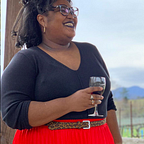Why Does My Voice Matter Now?
I was nervous to publish my first Medium article. I asked my loved ones to read it before submitting because I wanted to be careful and sure my words were accurate and respectful and effective. I never do that. Maybe it was the potential to have the story distributed through multiple channels that gave me pause. Maybe it was the lifetime of silencing politics I have been subjected to and consciously work to overcome?
One of my earliest memories is of loving school. An only child, I relished the opportunity to be with my peers and share my life with them. Coupled with the memories of days spent on the playground or in reading circle, is the recollection of report cards.
“Avery talks excessively.” Every reporting period from preK to 4th grade included the note that I was too interested in my classmates and not quiet enough. I don’t remember how it struck me at the time but I know that I have spent all my energy making sure I talk more than ever. Every decision from focusing my energy on Journalism in college and studying media discourses in grad school to seeking the highest degree in communication and culture. I resent that description to my core.
What a hurtful thing to say about a child. What were my parents to do? Talk to me less? Reprimand me for sharing my thoughts? Encourage me to shrink? Absurd.
As I matriculated and leaned into the “talkative” designation, I realized I was not the only victim of silencing. Women, particularly Black women, have had to deal with this as long as we can trace. Black women were dismissed in the suffragette movement. Black women do not receive the same public outcry in the face of systemic violence. Black women suffer and still shout.
I have always known the value of my voice even if I question it. My first publication was in the Greenville News Young Artists. The paper ran a content in schools and my 3rd grade teacher submitted a poem I wrote called “Chocolate.” I won a free banana split from a locally famous eatery.
As a Journalism major at Howard University, a media writing course allowed me to do some real journalism and real journalists have bylines. I wrote thought provoking pieces like Where Are The Black Women about black women in the advertising industry, Interns: The Forgotten Essentials about what to do with unpaid interns during a government shutdown, and Federal Cybersecurity article wherein I had I use every tool in my digital arsenal to track down a famed hacker to interview them.
In graduate school, I started a blog about my journey and wrote a literal book on food justice and strategic communications.
When I shared my article about the dissimilarity of my black body and statues honoring the confederate traitors, there was an overwhelming response. I got all the endorphins from seeing notifications pop up on my social media. The feedback was outstanding. Being a damaged human — like all writers — I could not just enjoy the moment. I’m a writer. I’ve been a writer. Why was my work only now seen as something exciting and worth rave reviews?
Despite the prowess of my pen, I’ve never really felt heard or that my writing bore consequence. Blame it on low self esteem. More like blame it on the racist superstructure that’s has worked to silence me.
We have found ourselves at a fascinating crossroad. Pandemic and cultural revolution. No one had this on their 2020 BINGO card. Another particularly interesting development in this sharknado of a year is the White consumption of Blackness and specifically Black outrage and pain. This is not a new phenomenon. In some ways, the viscerality of White allies’, “co-conspirators’,” and ilk’s hunger and digestion of Blackness is a great thing. It centers voices of the oppressed. It creates space to evolve and incorporate equity a foundation level in justice work. We need the broad coalition. The issue lies in the marginalized human become consumable.
It felt like a peep show. In April, I was part of an actually great zoom chat about centering Black voices and listening to your allies of color. We shared our stories and did the unpacking. However, as I listened to the guests and others speak, I browsed the participant windows and for the first time I understood what it would be like to live in a television. Couples huddled together under blankets surrounded by snacks. Singles perched with pets against backdrops of house plants and apartment decor. All on mute. All fixated on the black and brown faces exposing some of the deepest hurts we have held for so many unbilled hours of our lives. The voyeurism came to such a head presenters were calling for viewers to say something, anything. At the end, I received Venmo notifications with love donations from viewers. That was excellent thank you. It was also — for lack of a better word — weird.
Liberation work will not be fruitful without the full participation of every person who believes justice is worth it. The closer a co-conspirator is aligned with the power structure, the more is needed. Watching me or reading my words won’t undo systemic racism. Your clicks won’t cure sexism. Self flagellation is not the way. Consistent thoughtful recognition is required. Consider equity as you travel that path as well.
Why is my voice more special when I speak about my pain than any other topic? Everything I write is Black because I’ve written it. Everything I write from texts to tweets to theory to theses matter. Why do you only want to consume my Blackness when you can feel stung by it? The new wave of interest in marginalized thought is empowering. It’s opening space and creating opportunity. Be wary of tokenism and read everything I share with you.
